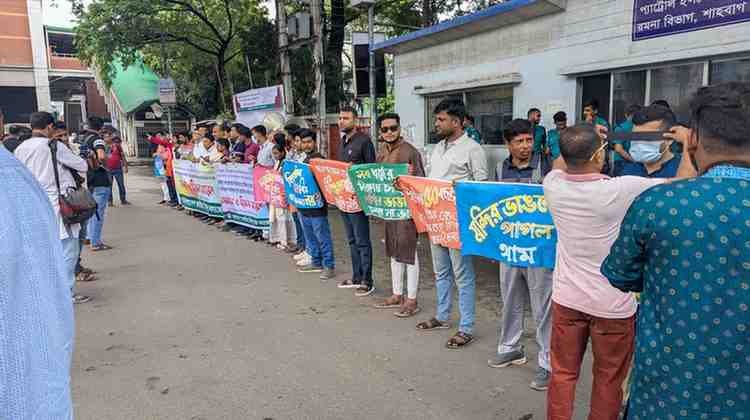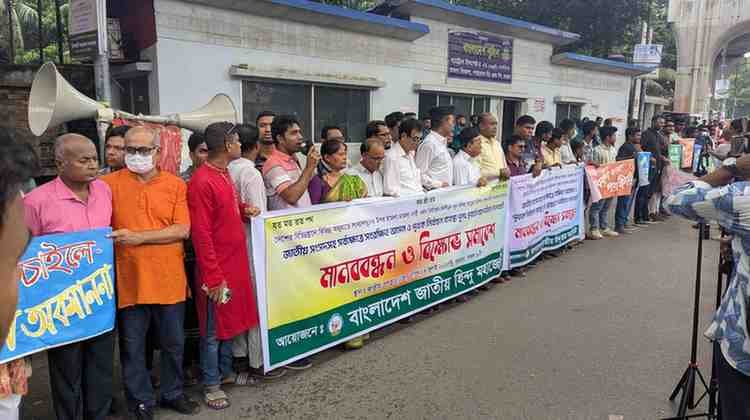Dhaka: Members of the Bangladesh National Hindu Mahajot gathered in front of the National Press Club in Dhaka on Friday morning to stage a protest rally and form a human chain, raising their voices against increasing violence, discrimination, and systemic exclusion of the Hindu community in Bangladesh.
The protest began at 10:00 AM and was organized to draw national attention to long-standing grievances, including recent attacks, false arrests, temple vandalism, and the continued absence of Hindu representation in state institutions and the National Parliament.
The demonstrators strongly demanded the restoration of reserved seats and a separate electoral system for minority communities in the National Parliament. They also called for exemplary punishment for those responsible for recent acts of violence and desecration targeting Hindus across the country.
Protest Against Violence and Injustice
The protest rally was prompted by several recent incidents, including the attack and arrest of Paresh Chandra Shil and Vishnupada Shil in Lalmonirhat.
The two individuals were reportedly injured and taken into custody under what protestors described as “false charges” based on fabricated allegations of religious insult.

Speakers at the rally condemned the repeated misuse of religious sentiments as a pretext for targeted attacks against Hindus.
Speakers also highlighted acts of temple vandalism, theft of religious artifacts, and widespread attacks on places of worship and Hindu households.
Recent arson attacks in Jessore, where 18 Hindu homes and businesses were allegedly set ablaze, were cited as evidence of the growing vulnerability of the minority community.
Community Leaders Voice Concerns
Prominent leaders of the Bangladesh National Hindu Mahajot addressed the crowd, including President Adv. Dinabandhu Roy, Executive President Adv. Pradeep Kumar Pal, Vice Presidents Dulal Mondal and Pradeep Kumar Das, and Chief Coordinator Bijoy Krishna Bhattacharya.
Other key speakers included Secretary General Adv. Govinda Chandra Pramanik, Joint Secretary General Dr. Hemant Das, and Organizing Secretary Kishore Kumar Barman.
They were joined by representatives from affiliated youth and student wings such as Hindu Jubo Mahajot and Hindu Chhatra Mahajot. The list of speakers included Gautam Sarkar Apu, Mrinal Madhu, Sajib Kundu Tapu, Apurba Mridha, and others.
The speakers accused the state of systemic discrimination against the Hindu population, pointing out that Hindus continue to face exclusion from key advisory bodies and reform committees. “There is not a single Hindu member in the 10 national reform committees or the advisory council. This speaks volumes about our exclusion,” one speaker said.
Historical Neglect and Land Seizures
Protestors reiterated that the Hindu community has suffered systemic neglect since the country’s independence. One major grievance voiced was the lack of Hindu representation in Parliament, which, according to the demonstrators, has led to the continued marginalization and persecution of the community.
The speakers also highlighted the seizure of nearly 2.6 million acres of Hindu property under the controversial Enemy Property Act. They pointed to specific cases of temple and property grabs, including the historic Madaneshwar Mahadev Jiu Thakur property in Dhaka, Shankhanidhi Temple on Tipu Sultan Road, and Sita Nath Temple on Hrishikesh Das Road. Protestors demanded that these and other properties be returned to the Hindu community.
Demand for Political Inclusion
The central demand of the rally was the reintroduction of reserved seats and a separate electoral system for minority communities, particularly Hindus. Speakers argued that without guaranteed political representation, the Hindu community’s interests continue to be ignored.
“If our demand for reserved seats and separate elections is not met, we will boycott the next national election entirely,” declared one of the leaders. This sentiment was echoed by several other speakers, who called for non-participation in voting unless concrete reforms are implemented.
The protest concluded with calls for national and international attention to the plight of Bangladesh’s Hindu community. The organizers emphasized that only meaningful political inclusion, protection of religious rights, and enforcement of laws against communal violence can restore the community’s trust in the democratic process.
As the crowd dispersed peacefully, the message was clear: without representation and justice, the Hindu community in Bangladesh feels abandoned—and is ready to take a stand.








